|

Autumn
1999 (7.3)
Page
40-43
In Search of
Truth?
Look
No Further than Jokes and Anecdotes
by Anar
I visited the
U.S. for the first time in 1973. I was with a group of film directors
and writers from Baku and we toured New York, Washington, D.C.,
Los Angeles, San Francisco and San Diego. We went to the top
of the Empire State Building, the tallest building in the world
at the time. We toured the numerous museums in New York-the Metropolitan
Museum of Art, the Museum of Modern Art and the Guggenheim. In
California, we traveled to Muir Woods, Disneyland and even the
San Diego Zoo. And, of course, as filmmakers, we made the rounds
in Hollywood.
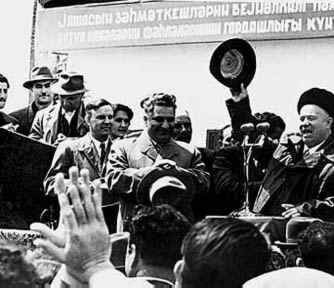  Photo: Khrushchev at Oil Rocks
on the occasion of the 40th Anniversary of Soviet Power, April
1960. National Archives. Photo: Khrushchev at Oil Rocks
on the occasion of the 40th Anniversary of Soviet Power, April
1960. National Archives.
Life in America, while glorious and much less restricted than
our own, had its own contradictions. We were visiting Washington
at the peak of Nixon's Watergate scandal. Of course, we had heard
a lot about democracy and understood it intellectually, but we
were admittedly shocked to see someone standing outside the President's
Oval Office handing out leaflets full of scathing accusations
against the President himself. No matter how progressive and
independent minded some of us thought we were, such blatant disregard
for authority and freedom of expression was beyond our imagination.
Photo:
Oil Rocks,
the world's first offshore oil drilling operation, 1959. National
Archives.
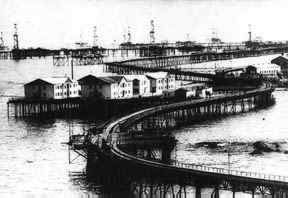 Seeing Seeing
 these
things burdened our hearts as we thought about the lack of human
rights back in our own backyard-the USSR. Ordinary Soviet citizens
were not even allowed near our leader's office-the Kremlin-much
less inside it, expressing critical views to every passerby. these
things burdened our hearts as we thought about the lack of human
rights back in our own backyard-the USSR. Ordinary Soviet citizens
were not even allowed near our leader's office-the Kremlin-much
less inside it, expressing critical views to every passerby.
Our tour guide turned out to be an older woman who had emigrated
from Yugoslavia. She was an American citizen and fluent in Russian.
On that trip, I was sharing a hotel room with Azerbaijan's well-known
writer Magsud Ibrahimbeyov. This guide took it upon herself to
try to smuggle books to the two of us. They were in Russian but
had been published in the West. Of course, all of them were packed
with anti-Soviet sentiment.
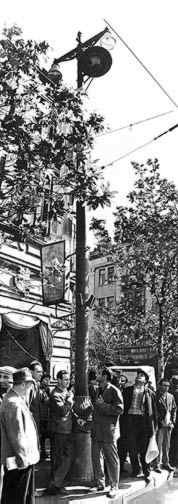  I'll
never forget our last night in New York City before we left for
Moscow the next day. We had hardly had any time to read any of
those books. I'll
never forget our last night in New York City before we left for
Moscow the next day. We had hardly had any time to read any of
those books.
Magsud finally reached the conclusion: "No problem, whatever
we don't finish reading, we'll just pack and take with us."
"No," I cautioned. "The customs officials might
discover them-we'd lose our chances to ever travel again."
"You can do what you want to, but I'm going to take mine
back with me," said Magsud.
"No way," I insisted. "I won't let you. Better
to stay up all night reading them."
And so we did. All night long-passing books back and forth to
each other. It was amazing what we discovered in those books-ways
that the KGB stalked people, persecuting and torturing them.
The unbearable conditions in Soviet jails and psychiatric wards,
and the horror of Stalin's labor camps.
The next morning Magsud admitted: "You were right. We would
have been in trouble if we had tried to take these home."
But then we had to figure out how to get rid of the books. We
couldn't just leave them in our room. Agents would have questioned
us immediately. Culturally, we couldn't give them back to our
guide who had so graciously given them to us in the first place.
"Why don't we leave the books on some other floor of the
hotel-not this one," I suggested.
"Which floor?" Magsud wondered.
"Well, why not the 17th floor?"
"Why 17th?"
"Well, you know, the October Revolution broke out in 1917,"
I replied.
So we gathered up the books, carried them up to the 17th floor,
left them in the corridor and hurried back to our room.
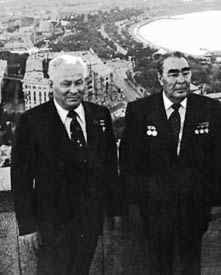  But
that wasn't the end. When our plane landed in Moscow and we were
going through customs, our friend Polad Bulbul-oglu [now Azerbaijan's
Minister of Culture] came over to welcome us back. Polad was
one of the most popular variety singers in the Soviet Union at
the time. He spent more time in Moscow than in Baku and often
traveled abroad. Therefore he had a lot of friends at the airport. But
that wasn't the end. When our plane landed in Moscow and we were
going through customs, our friend Polad Bulbul-oglu [now Azerbaijan's
Minister of Culture] came over to welcome us back. Polad was
one of the most popular variety singers in the Soviet Union at
the time. He spent more time in Moscow than in Baku and often
traveled abroad. Therefore he had a lot of friends at the airport.
Photo:
Chernenko
and Brezhnev in Baku, 1978. National Archives.
Nodding to one of the guards, he said, "Vasya, let them
pass, they're my friends." It was as simple as that.
Then Magsud started blaming me: "Did you see? No one checked
us. I shouldn't have listened to you, I wish I had brought those
books with me."
"But what if Polad hadn't come and they had caught you?"
I asked.
The truth is, I had dared to pack one of those books in my bag-one
that we hadn't had time to read. It was George Orwell's novel
"1984." The title sounded innocuous enough-like fiction.
Later on when we started reading it, we realized that this allegory
was even more anti-Soviet than any of the rest of them.
Time solved our argument. Fifteen or sixteen years later, all
of those forbidden books were somehow circulating quite widely
throughout the Soviet Union. Some were even being published in
Russia, giving everybody the chance to read them. By the early
1980s even newspapers were exposing the horrors of the Soviet
period.
Sense of Humor
Many years have gone by since that trip and even eight years
have passed since the breakup of the Soviet Union. It all seems
so far away, as if we were talking about a completely different
century, like, for example, the Middle Ages. It's true, the Soviet
system was somewhat like the Middle Ages with its feudal system.
When we think back on those years, it's strange that we not only
think about the crimes of that system but also about its humorous
moments. People expressed their true feelings about the society,
its political system and leaders only by anecdotes whispered
in one another's ears. Jokes were the most popular and most democratic
of folklore genres during the Soviet period. Many of those jokes
are still vivid in my mind.
Two Sparrows-A
Joke
Two sparrows meet in the air. One of them is flying from the
USA to the USSR and the other is going in exactly the opposite
direction.
The sparrow from the USSR asks the USA sparrow: "Why are
you leaving the USA?"
The bird replies: "Because the USA is tying the bales of
wheat that it sends to the USSR so tightly and loading them so
efficiently that not even a single seed drops out. So I'm starved.
Those bales are heading for your country where they say that
half the wheat is lost and scattered around wherever the bales
are unloaded. So I'm flying there to get some food.
"And where are you coming from?" the USA bird asked.
"From the USSR. I'm flying to America."
"But why? Isn't it true that seeds are dropping out of bales
there?"
"It's true."
"Then why are you heading to America?"
"I'd like to chirp a little bit."
Or there's another
one that describes the twisted irony of the Soviet bureaucracy
in six steps. It went like this:
1. There is no unemployment in the USSR, however no one is working.
2. No one is working, but all the plans are fulfilled.
3. All the plans are fulfilled but the shops lie empty.
4. The shops are empty, yet everyone has everything they want
at home.
5. Everyone has everything at home but everyone is disgruntled.
6. Everyone is disgruntled, nevertheless everyone votes together
in common consent.
Gaining Stalin's
Favor
Another category of jokes targeted the Soviet leaders-like Stalin,
Khrushchev and Brezhnev. Of course, their own personalities and
activities fueled those anecdotes.
Our late maestro Niyazi told me the following anecdote about
Stalin. In 1938, during the celebration known as "The Decade
of Azerbaijani Art", which was held in Moscow, Uzeyir Hajibeyov's
opera "Koroglu" was performed at the Bolshoi Theater.
After the performance, Stalin and a number of other Politburo
members met with the composer and the performers.
One of the members of Stalin's close circles complimented Hajibeyov
by saying, "You should write two more operas like that."
But Stalin interrupted him with an emphatic "No."
Uzeyir was taken by surprise at Stalin's abrupt answer which
filled him with dread especially since hundreds of thousands
of people had been deported to prison camps or labor farms just
the year before-1937. One didn't have to be guilty of anything
to receive such a verdict. Uzeyir knew that Stalin's opinion
would essentially determine the fate of both the work and his
career.
After a long pause, Stalin clarified the tense moment: "No,
he shouldn't write two more operas; he should write four more."
Khrushchev Comedy
Jokes about Khrushchev tended to emphasize his stupidity. Once
when Khrushchev visited Baku, they gave a banquet in his honor
at Oil Rocks, the oil project that had been built up on piers
in the Caspian and which was recognized as the world's first
offshore drilling project. Attempting to flatter Khrushchev,
one of the local leaders told him: "It's so difficult for
us to run even this small field here, it must be immensely difficult
for our dear Nikita Sergeyevich to rule such a vast country."
To which Khrushchev, who was already stone drunk by that time,
replied: "It's not difficult at all. Any stupid old clod
can do it."
Another anecdote relates how Khrushchev was visiting one of the
Central Asian countries and was met by the elders in the community.
Such leaders are called "aghsaggals" which means "the
ones with the white beards" who are highly respected for
their wisdom and experience. But Khrushchev mispronounced their
title and called them "saxauls" which in Turkic languages
identifies the name of a cactus-like plant.
Of course, many people remember the episode when Khrushchev took
off his shoe and banged it on the table when he was addressing
the UN. "We will bury you," he had threatened the West.
Despite this outburst, we must never forget the crucial role
Khrushchev played in breaking Stalin's dictatorial grip and in
daring to "dethrone" his predecessor after his death
[1953], especially since a huge personality cult had been built
up around him. Khrushchev loosened the noose on the republics,
which eventually led to the demise of the Soviet Union. We must
respect him from this point of view. [An ironic twist took place
in the summer of 1999, when Khrushchev's grandson became a citizen
of the United States.]
Brezhnev Banter
I myself witnessed some of the melancholic comedy that was related
to Brezhnev. Once Brezhnev was giving a speech in Baku at what
is now called Respublica Palace (at the time, it was known as
Lenin's Palace). In the middle of his speech, I noticed that
Heydar Aliyev and a number of other dignitaries who had come
from Moscow were looking on quite nervously and whispering among
themselves.
Eventually, one of them went up to the platform and whispered
something in Brezhnev's ear. Brezhnev nodded and said, "Hmmm,"
but continued reading his speech. Again, those dignitaries started
whispering to each other. Finally, Heydar Aliyev (now our President)
got up, went to the platform, replaced the text with a new one
right while Brezhnev was reading.
Brezhnev started reading the new text in the same robot-like
monotone. Realizing that some of the ideas were the same as what
he had just read, he interrupted himself and said: "It seems
as if I've already read this."
It turns out that he had confused the two texts. One speech was
intended for the meeting during the day; the other was for a
banquet that would follow in the evening. Some of the text was
common to both speeches.
In any case, if Brezhnev had continued with the first speech
at the end, it would have read, "Now let's raise this toast..."
I once had a chance to observe Brezhnev very closely. He was
panting heavily like a fish out of water, almost like he was
choking. And his eyes were glazed over. When you looked at him
closely, he seemed like a robot dressed as a human and wearing
a human mask. Eventually Brezhnev died, and Andropov replaced
him. It wasn't long until Andropov also died and then Chernenko
replaced him. And then came Gorbachev.
Mistaken Identity
A true life experience in 1985 made me realize just how much
Communist Party members had already lost respect for the political
hierarchy in the Soviet Union.
At that time, I had the occasion to go to Nakhchivan as part
of the Theater Society. After putting on a drama there, we were
supposed to continue on to another region. But the following
day, we heard that the head of our delegation, producer Shamsi
Badalbeyli, had fallen ill. His heart was giving him trouble.
Shamsi urged me to go ahead even though he wouldn't be able to
join us. He was lying in bed and looking very pale when I left
him. His son Farhad Badalbeyli, a well-known pianist, was by
his side.
We were concerned but we left Shamsi Muallim [a polite term meaning
"teacher" that was very common during the Soviet period]
and headed on to the next region. When the mayor of that region
was welcoming us and explaining the program, someone came up
to him and whispered something in his ear. The mayor turned pale,
and began to consult with the Secretary of the Communist Party.
Then he apologized to me: "We'll have to postpone the theatrical
production. But let's go have dinner anyway, and then you can
go back to Nakhchivan."
"What's happening?" I asked.
"The man died."
"What?" I replied, shocked. "Get me a car, I'll
have to return to Nakhchivan right away."
"Anar Muallim," he begged, "stay and have dinner
with us.
We've arranged a small banquet here; you can go later."
"What are you talking about? Banquet? Dinner? I can't do
that. We're close family friends. His son is there all by himself
having to deal with the situation alone. I'll have to head back
right away."
As I glanced around, I noticed that the local leadership and
the Secretary of the Communist Party were eyeing me rather suspiciously.
After a few minutes, it became evident that there had been a
dreadful misunderstanding.
Thank God, the man who had died wasn't Shamsi Muallim at all.
It was the leader of our country, Chernenko (1911-1985). That's
why everybody had been so surprised at my reaction when I insisted
that we were close family friends and that I didn't want to leave
his son alone during those difficult moments.
Of course, the death of every man is a loss, and may God rest
Chernenko's soul. Our relief came not because Chernenko had died,
but because Shamsi Muallim was very much alive. We dined together
that evening and raised our glasses in toasts and celebration.
Later, Nakhchivan's Secretary of the Communist Party approached
me: "Who do you think we are, Anar Muallim? Did you think
that we would have carried out that banquet if Shamsi Muallim
had died? No, never. After all, we are Muslim."
His words made me realize that we had already entered into a
new period that Gorbachev would call "Perestroika"
- Restructuring. Such an incident would never have happened on
the occasion of Stalin's or Brezhnev's death. Something had already
begun to change in the psychology of the people and in the common
spirit and structure of society. Even though we could sense these
changes taking place, none of us could ever have imagined what
the final consequences would be in such a short period of time.
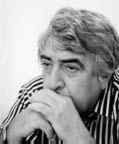 So
at the same time that Chernenko was being mourned in Moscow,
we were entertaining ourselves in Nakhchivan. It must have been
our destiny to part from our difficult past by entertaining ourselves.
The melancholic comedy of the Soviet system was ending. So
at the same time that Chernenko was being mourned in Moscow,
we were entertaining ourselves in Nakhchivan. It must have been
our destiny to part from our difficult past by entertaining ourselves.
The melancholic comedy of the Soviet system was ending.
Anar
is one
of the most well-known prose writers in Azerbaijan today. He
comes from a distinguished family of writers; his father Rasul
Reza
and
mother Nigar Rafibeyli were also featured in our Literary issue
in Spring 1999 [AI 7.1]. Anar, who is President of the Writer's
Union, has been a frequent contributor to our magazine.
From
Azerbaijan International (7.3) Autumn 1999.
© Azerbaijan International 1998. All rights reserved.
Back to Index AI 7.3 (Autumn
99)
AI Home
| Magazine
Choice | Topics
| Store
| Contact
us
|


 Seeing
Seeing


 So
at the same time that Chernenko was being mourned in Moscow,
we were entertaining ourselves in Nakhchivan. It must have been
our destiny to part from our difficult past by entertaining ourselves.
The melancholic comedy of the Soviet system was ending.
So
at the same time that Chernenko was being mourned in Moscow,
we were entertaining ourselves in Nakhchivan. It must have been
our destiny to part from our difficult past by entertaining ourselves.
The melancholic comedy of the Soviet system was ending.